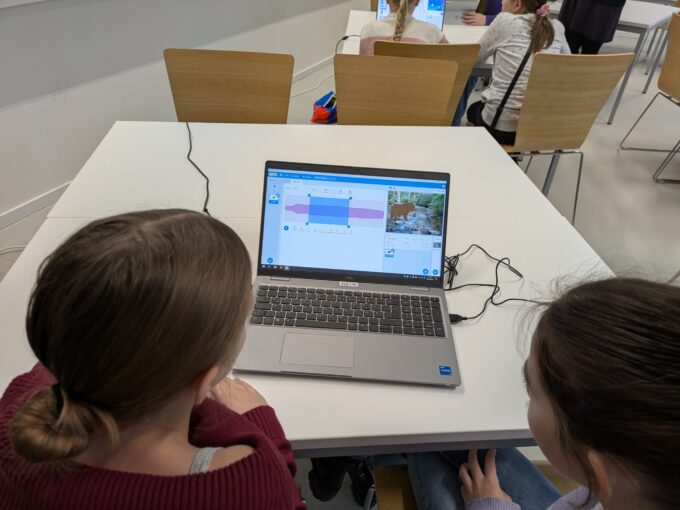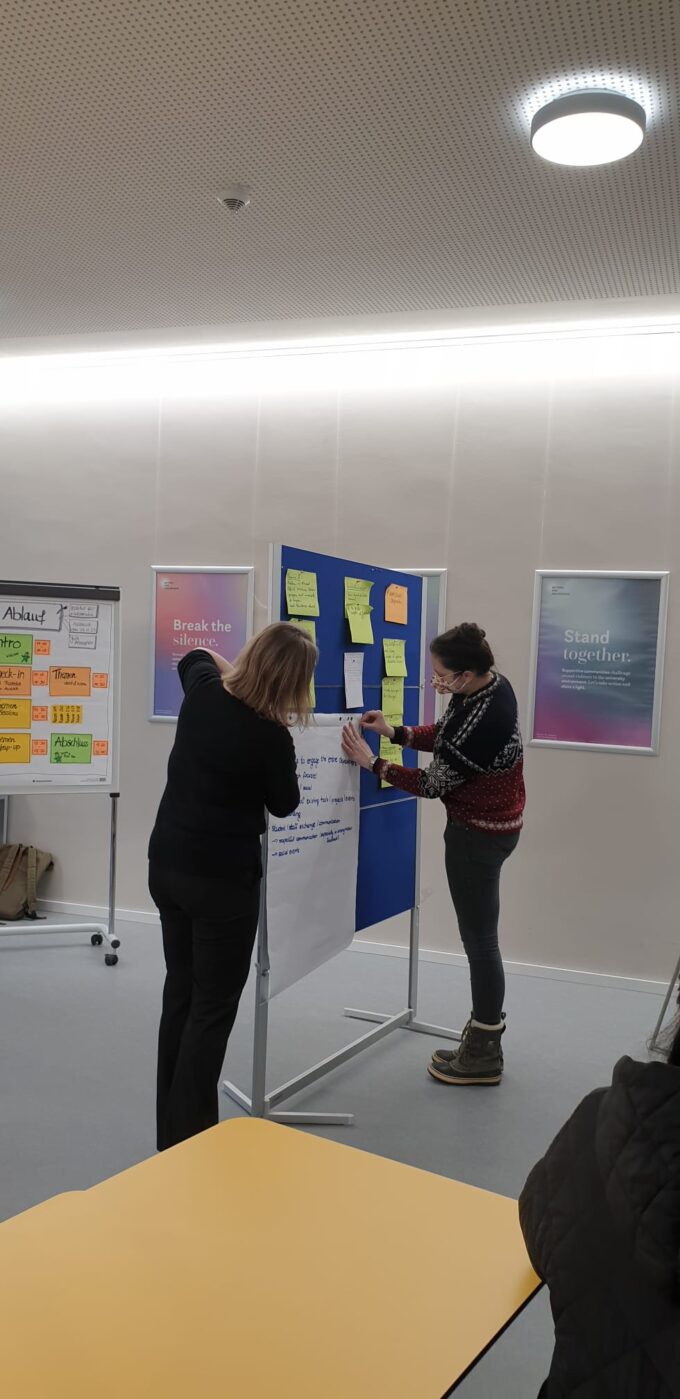
„The first time she went up to a robot it didn’t even recognise that there was a human in front of it”
Follow Prof. Angelica Lim on her quest to make computer science more inclusive
Im Wintersemester 2022/23 hat am Institut für Informatik der Christian-Albrechts-Universität zu Kiel das Seminar „Women in Red“ stattgefunden (inspiriert durch das gleichnamige Wikipedia-Projekt). Gemeinsam mit Studierenden der Informatik und Wirtschaftsinformatik haben Prof. Dr. Isabella Peters und Prof. Dr. Thomas Wilke sich dort mit Informatikerinnen, ihren Biographien, ihrer fachlichen Arbeit und ihrer informatischen Forschung beschäftigt. Auf diese Weise lernten die Studierenden weibliche Identifikationsfiguren und Vorbilder sowie verschiedene Themengebiete der Informatik kennen.
Das folgende Interview mit Prof. Angelica Lim, PhD ist so entstanden und darf mit freundlicher Genehmigung durch Angelica hier veröffentlicht werden.
Viel Spaß beim Lesen!
This is a transcript of an interview with Dr. Angelica Lim, Assistant Professor in the School of Computing Science at Simon Fraser University, Vancouver. It was conducted by Moritz Dudey, a Computer Science student at CAU Kiel, on November 8th, 2022 via an online video conference. The interview was done as part of a seminar called „Women in Red“, discussing among other things the lack of representation of minorities in Computer Science. If you want to see Angelica in action we highly recommend watching her talks.

Moritz: Why did you choose to go into Computer Science?
Angelica: The reason I went into computer science… Well, […], my mother was a programmer for twenty years. She was one of the early programmers in the Philippines – she was a mathematician. At the time, the first programmers were coming out of Math departments, so she went into that and started working as a programmer in North America. But throughout my life I didn’t really think I would follow in her footsteps; I didn’t even really know what she did. I thought I was going to be a music teacher or something else having to do with music. In the end, because I excelled at math in high school, I was looking at what you can do with a Math degree. This was in the early 2000s, when Computer Science wasn’t as big of a thing as it is now. So I was looking at what you can do with a Computer Science degree and I thought „it looks like it could be a growing field in the future“, so I joined that.
Where did you spend which parts of your life?
My parents were born in the Philippines. They are Chinese-Filipino in heritage, and my family spoke Tagalog, one of the two official languages in the Philippines. But I was born just outside of Los Angeles, California. And I suppose this had another influence on me, which is that I would often go to Disneyland, where they had a lot of animatronics. And so for me, this impression and illusion of life was something I saw nearly every weekend and was fascinated by. I know I wanted to be a Disney „imagineer“, the people who build the themeparks, at some point in my life. When I was around eight, I moved to Vancouver, where I am now. I did university here, and then I did grad school in Kyoto, Japan for six years. Then I went to France and worked there for three years.
I felt that if I had a doctorate, people would take me seriously as a woman in Computer Science
Angelica Lim
In the time you have spent in the field of Computer Science, did you ever get the feeling that, being part of a minority among fellow computer scientists, you were being treated differently in some way?
Yes, definitely. I love research, but subconsciously, I think that part of the reason I went to get my PhD was because I felt that if I had a doctorate, people would take me seriously as a woman in Computer Science. As a PhD student I went to IROS, an international robotics conference, and a year before I had won one of the best paper awards. And there I was, the next year, and people would approach me and say: „Oh hi, are you in sales?“ Or „what company are you working here for?“ because they assume that is what a woman is at a conference for: working a booth, right? Luckily, one of my colleagues said „No, she is a roboticist, she won an award here last year“. This just happens, and so much so that for every single conference I went to after I got my PhD, because I look young, I put „Dr.“ before my first name. When you register for a conference, you give them a first name and last name, and I would enter „Dr. Angelica“ as my first name so that on my name tag there would be an indicator that I am not a salesperson. They call it micro-aggressions, and people think of it as „death by a thousand paper cuts“. Your confidence is being whittled away, because every time you present yourself, you have to argue your place or prove somehow that you’re smarter than they think, I guess.
And also there is this kind of discrepancy. I was in Japan, and I like the „kawaii“ culture with its very cute dresses. I like dressing cute. And there is a disconnect I think. Now that I am a professor, I wear a tweed jacket. You kind of have to dress for the part. I didn’t really like wearing tweed jackets, but I noticed that when I put it on, I didn’t have to deal with microaggressions. Can I just wear a hoodie and be taken seriously as a programmer? You know, these are things that guys probably don’t have to think about. So for me, either it has to be a black or brown leather jacket. I felt I couldn’t dress ladylike, because if I did, the microaggressions would return. Well, a leather jacket or tweed jacket is my standard wear for talks and things.
I didn’t experience too much overt, purposeful aggression. I don’t think anyone was ever purposefully trying to reduce my stature or anything like that. I think it was very much unconscious. And to be honest, I am pretty sure I’ve done the same thing. I’ve met some other women in conferences, and now I try to ask „what level are you in?“ instead of just asking „oh, are you an undergrad?“ and then they’re a PhD student. That can be embarrassing. So I’m not saying I am completely immune to it either, but I am trying to ask different questions, to avoid the same thing that I’ve been through.
So you are saying that you’ve internalised these stereotypes as well?
I think so, yes.
Did you ever meet people that didn’t cope with this possibly hostile environment as well as you did? People who are not doing what they wanted to do because of such experiences?
Hm, let me think. There are old memories and more recent memories. So, older memories are for example: back in undergrad, a four-year program. It was a hard program. By second year – maybe you used to be a straight A-student in high school – and now there’s one class where you get a B or C. And you think „oh my goodness“. What happened to myself is that at that point you think, „I must not be cut out for this.“ It cuts you deeper when you’re a minority, because it’s always in the back of your head: „There are so few of me. Why is there so few of me? It must be because I don’t belong here. Oh, I didn’t do well in that exam, I must not belong here.“ The tipping point is a lot more sensitive when you’re a minority because there is nothing that boosts you to say that, even despite that grade, I should go on. So there’s that. I can’t remember any of their names, but I think there were other girls who experienced the same thing and dropped out before they finished their degree because of it. Even though they were doing better than their male peers on average, just because of the perception.
There are so few of me. Why is there so few of me? It must be because I don’t belong here
Angelica Lim
In terms of hostility, there were also some hostile moments when we were trying to make a „women in Computer Science“ group to support each other, and have meetings where it’s just people from that group so they can share stories, and feel in a safe environment. But at the time, we got some hostility from men, saying: „That’s sexist, it should be open for all.“ They would attack us for „being sexist“. Eventually we made our events open to all genders. Just in the beginning we wanted to meet each other and see each other, you know.
And then, a more recent thing: I have a kid, a preschooler. The tenure track system in Canada and the US is a very stressful gauntlet where you are trying to get a tenured professorship. And in order to do that, you have to publish as much as possible within a six year period. And unfortunately, this six year period also coincides with women’s last possible years to have children. So at that point, many of my colleagues will drop out. They will go and work in industry or work as a lecturer, which is a permanent position, but not a full professor, not a tenure track professor. Because – what are my options? Either I go for a tenure track position and I don’t have enough time to actually deal with giving birth, or my marriage fails because of the home-life balance problems. I have heard one lecturer say,“I would have to get divorced if I wanted tenure track, so I just became a lecturer“. It is a system that was built for professors a century ago or more, where it was assumed that you would have a full-time person at home taking care of the family. I am in the middle of my week, I am managing the undergraduate program of 3000 undergrads because I am the director of the undergraduate program. I am managing my lab of seven students. I am teaching my class of 200 students. And then, I am also on my phone at noon, because that’s when swimming lessons open, and I am like „I have to sign up my kid for swimming, oh my god, I missed the window“. So it is about trying to balance all these things in life and a lot of women will say that it’s not worth the risk: „I want to have a kid, so I won’t do tenure track.“
Can I just wear a hoodie and be taken seriously as a programmer?
Angelica Lim
Do you think this is going in circles? The system is not designed for women, so women who want to have a family are less likely to become a professor. If there are less female professors, female students experience the problem of feeling like they don’t belong that you described, so they drop out, and so on…
Oh yes, 100 percent. I think that is a very good way to put it, it’s a vicious cycle. And I think the issue with the tenure system is that it is a worldwide system. So even if you have the will at a local level, how do you change the system, which is so well entrenched in so many places? I don’t know. But my choice is: I have a position which is non tenure track but I have all the responsibilities. I have a permanent professorship where I do research, teaching and service just like a tenure track person except that it’s slightly different: I have a professional practice designation, and I teach a little bit more. So it’s not tenure track – I don’t have a precarious position for six years based on the number of publications I have. I’m very happy with my position, but it’s not available to many people.
How many of the 200 students in your class are female?
Well, that’s very interesting, because I teach the „introduction to computer science“ class. And there are 40% women in this class. Which is huge. It’s a lot. So, some possible reasons are that it is a class that is offered to all of the faculties, so anybody who is interested, whether they’re in arts, biology or business, can sign up. And so I see that there is interest, or maybe they just realise that they have to learn some programming for every discipline they’re in. Yet, in computing major the percentage of women is about 20%, I believe. Which is higher than it was a few years ago.
Is there anything you try to do for these 40% in your class? To encourage them to stay with the subject? Do you feel a responsibility to help them because the system is in part designed against them?
Well, I revamped my undergrad curriculum, my first year class. There is this idea, and there are some papers regarding this, that women in computer science are motivated by the outcomes – what you can achieve and the problems you can solve with it. Computing science as a tool. In most of my exercises, I ask them to build programs that are actually interesting, where you can actually see what the application does. As opposed to just a bunch of problems that are completely disconnected. And then I’ve worked to try and revamp our undergrad curriculum to make the internal transfer a lot more streamlined. So students just have to take three courses instead of five to transfer in. Because every barrier you put in front of these minorities is a point where they might go away. If it’s kind of hard to get into the next class in order to do that transfer – it’s full, and so you’re wait-listed and you can’t get in – you’re going to start thinking to yourself: „Oh, maybe I’m not meant to be. I’ll just stick in biology.“ So, the fewer barriers there are, the easier it is. And the unfortunate thing is, they might love it. They might have discovered computer science in university because they just never had it in high school. And the unfortunate part is, at least in my university, that there would be the guys that did computer science in high school, they’re in the program, and maybe they had the exact same GPA (grade point average, a measure of academic achievement) as the girls who discovered it in university, and yet the girls have to jump through all these hoops now to transfer in. You just discovered it sooner, maybe because you liked videogames or had other reasons to have programmed before. So now one thing I am really excited about is trying to push down some of my curriculum into highschools so that more highschool students can discover it.
Would you say that there has been a development? Are things different now than when you started studying? Did you have any female professors at the time?
I am trying to remember… I don’t think so. There might have been one lecturer around. But all the women in my department were administrative staff. There were some that were teaching some 400-level courses that I never took. So there were a couple there, they are now retired. But a couple out of 40…
Some of the things are changing at the conference level. I can see at conferences they are trying to get away from having presenters be all male. So they are trying to diversify conferences, and at least to put forward more faces in it. When I went to my recent robotics conference, I could see that they put a lot of effort into trying to make it welcoming. And at the university level, you know, everyone is trying to hire more women. But because of the reasons I told you before, there are fewer of them, the pipeline is small. Competition is high to get these women to come join your faculty. And then that issue that I mentioned about having to choose between a family and being a tenure track professor.
How important do you believe is diversity for computer science?
I’ll give you an example of a recent paper, it was done by one of my students. We got the best paper award at a big conference, a robotics conference. It was nice, it was at the same conference where I got mine ten years ago. The paper was about an automatic gesturing system, so you input text and it would output a 3D model of gestures to go along with the text. And in this paper, the idea was about diversity, because we found that the gestures were really repetitive. It didn’t look good: you want a robot to be engaging, and you don’t want it doing the same thing over and over. You want it to be more diverse because that is how people actually gesture, with little unique flourishes here and there (gestures with her hand). And so, coming at it with the mindset that we want diversity, it is not even just that we want to do inclusion, but it actually can make things better overall. A lot of papers I am doing these days have diversity in mind, and it is for inclusion in some cases. But in others it is just better, period. People thought it more human-like. People found it more engaging. More diverse, less repetitive and boring. So if we want something in our lives to be more interesting, then diversity is nice to have in general.
How dangerous do you think is a world where computer science is done mainly by white men? Looking at racist algorithms because of racist training data. Do you think the struggle for a more diverse computer science is not just obviously the right thing to do but actually a way of keeping future dangers at bay?
You probably know about the seatbelts (referring to the fact that test dummies for crash tests often test the impact of a car accident on a model of an average male body only), that is the typical example. I’ll just talk about one example, it’s not really about safety, but it is this idea of inclusion and accuracy. There is a colleague of mine. She said the first time she went up to a robot it didn’t even recognise that there was a human in front of it.
I didn’t exist in the eyes of the robot. It couldn’t see me, so therefore I didn’t exist.
Angelica Lim quotes a female colleague working with robots
It’s just these types of algorithms. I mean, I know – I worked at a tech company: You do a lot of initial prototyping and with these types of things and the first tests are like you and the programmer going like this (grimaces), I was trying to get a robot to detect a smile or something like that. So you’re like „oh, it seems to be working, let me try to get my co-worker to do it.“ Okay, it seems to work okay for them. And then you start to get a big dataset and then try and check your test cases. But in most cases you’re prototyping first as a software engineer. I am lucky that I had a black woman on my test team, we had someone from Japan, so it was a relatively diverse team. But then again we were all the same age. So I don’t know if it’s going to work for kids or older adults. Is it okay to get that data and test it, with privacy? One of the papers we recently did was about Sim2Real. It was about using simulated humans for reality. We were trying to make a huge dataset to train one of our algorithms to recognise emotional expressions. And we just took a small dataset from the internet of a few hundred videos and made it into five thousand, with lots of different morphologies, face types, skin complexions from dark to light, different ethnicities so we could train our algorithm to detect more people. I don’t know if you’ve done any machine learning, but if we unfroze some of the earlier weights (put simply, weights in an artificial neural network determine how strong a connection between two neurons is) to train the feature extraction layers, then that’s where we got our biggest boost in results. So, I guess we’re hoping that these machines can actually tell that we exist, at minimum!. You’ve seen other examples, like putting your hand under a hand dryer and it doesn’t react…
You’ve been to a variety places throughout your career. What differences did you encounter regarding how welcoming computer scientists were?
That’s a good question. So, Japan is still very patriarchal. One of the reasons I left was simply that it was very difficult to advance. They have what we call a glass ceiling, you could see the limit of where you could go. When I worked in industry in Japan I noticed there was a limit to my progress as a foreigner. In France… You know, it’s funny, some of the harshest words that have been said to me, some of the most discouraging words, were from other women who were senior women. I don’t know if it was just that they had to go through so much fifty years ago to get where they are, that they are hardened or something. I don’t know. But those were some of the worst mentors. I have had wonderful female mentors, too. I definitely like North America, because there are so many immigrants, there is an obsession with diversity here more than I saw in Japan. It’s interesting. In North America, everyone speaks English and we think of diversity of your face, skin colour, accent, and so on. But in Europe it is diversity of culture, food, language. There are different definitions of diversity depending on your perspective. We have to know our own biases.
How many Filipino women professors have I met in robotics? I don’t know any.
Angelica Lim
One idea of the seminar is to increase visibility for minorities in computer science. Would you be okay with me maybe writing a Wikipedia article about you?
I would love that. I would really appreciate it, actually. I’ll just tell you this: One of the reasons I have done so many talks is not because I am an egoist or because I like to see my face out there. I was originally pretty shy as a person. But I knew that as a woman of color, if you want to call me that, if I don’t put my face out there, then that’s fewer women that can see this as a path for people like me. I have a responsibility. How many Filipino women professors have I met in robotics? I don’t know any.
Thank you so much for your time.
View Comments

Galerie der Informatikerinnen
Gemeinsam mit Studierenden der Informatik und Wirtschaftsinformatik beschäftigen wir...

